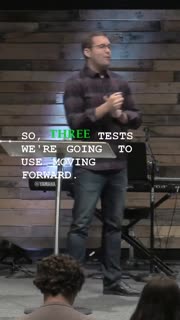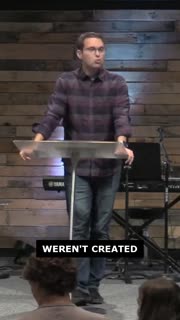Relying on God: Debunking Misleading Biblical Advice
Devotional
Sermon Summary
Bible Study Guide
Sermon Clips
1. "Part of the Harvest family, what is our vision? Make, grow, and equip followers of Jesus to fulfill their God-given purpose in life. And we do that through community, discipleship, and outreach." [52:15] (9 seconds)
2. "How many of you know that the world around us today is full of advice? Everywhere we turn, somebody's trying to advise us in some form or fashion. We get tons of advice from social media. Now, how many of you would agree that sometimes you're on social media a little too much? You probably need to cut back a little bit." [53:56] (19 seconds)
3. "How many of you have heard bad biblical advice? So let me give you a few examples. And these are just some statements I thought of. And all of us have probably heard these at some point. And you may have heard some of these statements. You may believe some of these statements. You may believe some of them. And you can just let your hand if that's you and kind of get a gauge of where the room is. But how about the statement, God helps those who help themselves. That's in the Bible, right?" [58:18] (31 seconds)
4. "How many of you know that there's no shortage of people that are trying to give us advice? Well-meaning advice, many times. And many times, it's not just me. It comes across really good and really helpful. And the whole idea is to make a person feel built up and make them feel better, right? In the middle of whatever it is they may be walking through. Hopefully, I think the hope is that it inspires us and inspires us to keep on plugging along, even when we feel like giving up." [57:33] (32 seconds)
5. "So we're going to look at our tools. And we're going to try to figure this out. And what the Bible is really saying. Now, here's the thing. I believe this verse actually originated from 1 Corinthians chapter 10. So if you've got a Bible, you can turn there. In 1 Corinthians chapter 10. You can also follow along in the YouVersion Bible app. If you hit more and hit events, our notes should pop up. And you should be able to follow along from there. Or right on the screen. But I believe this comes from 1 Corinthians chapter 10. And remembering, again, even a well-meant encouragement, if it's false, could actually be dangerous in your life." [01:06:55] (33 seconds)
6. "So, three tests we're going to use moving forward. Number one is context. Everybody say context. Guys, context. You probably understand context. Context is so important. There is a statement actually that context is king. In communication, context is king. So, we look at things and, for instance, Scripture. When people use Scripture out of context, they're usually using it as a weapon or they're using it to prove a point. Their own point. Context is king. You can take a single verse out of the Bible out of context and almost make it say whatever you want it to say." [01:02:18] (42 seconds)
7. "So here's what we're going to do, guys. We're going to look at the whole Bible. We're not going to do it today, because that would take a long time. But we're going to basically kind of look at the mindset of what is happening throughout the entire Word of God. And then we're going to look and see, does this work? Does this statement fit with what we see when we look at the entirety of the Word of God?" [01:14:19] (30 seconds)
8. "So we are built to need him alongside of us. And so God wants us to learn to depend upon his presence. And the second thing he wants, God wants us to learn to depend upon his power. God wants us to learn to depend upon his power. Guys, how many of you in this room, would lift your hand up and say, I have experienced the power of God in my life before?" [01:30:25] (19 seconds)
9. "Guys, remember how we talked earlier about the danger of a biblical statement that's not 100% accurate? God doesn't give you more than you can handle. Here's the problem with that statement sometimes. When we're really going through it, it makes us feel inferior and flawed and incapable of handling things on our own. That's the point. Yes, we are incapable and flawed and incapable. We are incapable of walking through this on our own. We need his power and we need his presence. We weren't meant to live life in our own power and strength. We were meant to live life in his power and his strength." [01:31:11] (36 seconds)
10. "Guys, we weren't created to handle the hardships of this life. Because here's the deal. God wants us to experience the joy and the healing that his power brings. Guys, can you imagine how underwhelming it would be if you could handle everything really easily? Like, I mean, some of you back in the late 80s, early 90s, those of us who grew up in that time and were gamers, and they started coming out those little first player shooter game things. And they had little cheat codes you could put in. And you got to a place where they had what was called God mode." [01:34:01] (30 seconds)
Ask a question about this sermon
2. "How many of you know that the world around us today is full of advice? Everywhere we turn, somebody's trying to advise us in some form or fashion. We get tons of advice from social media. Now, how many of you would agree that sometimes you're on social media a little too much? You probably need to cut back a little bit." [53:56] (19 seconds)
3. "How many of you have heard bad biblical advice? So let me give you a few examples. And these are just some statements I thought of. And all of us have probably heard these at some point. And you may have heard some of these statements. You may believe some of these statements. You may believe some of them. And you can just let your hand if that's you and kind of get a gauge of where the room is. But how about the statement, God helps those who help themselves. That's in the Bible, right?" [58:18] (31 seconds)
4. "How many of you know that there's no shortage of people that are trying to give us advice? Well-meaning advice, many times. And many times, it's not just me. It comes across really good and really helpful. And the whole idea is to make a person feel built up and make them feel better, right? In the middle of whatever it is they may be walking through. Hopefully, I think the hope is that it inspires us and inspires us to keep on plugging along, even when we feel like giving up." [57:33] (32 seconds)
5. "So we're going to look at our tools. And we're going to try to figure this out. And what the Bible is really saying. Now, here's the thing. I believe this verse actually originated from 1 Corinthians chapter 10. So if you've got a Bible, you can turn there. In 1 Corinthians chapter 10. You can also follow along in the YouVersion Bible app. If you hit more and hit events, our notes should pop up. And you should be able to follow along from there. Or right on the screen. But I believe this comes from 1 Corinthians chapter 10. And remembering, again, even a well-meant encouragement, if it's false, could actually be dangerous in your life." [01:06:55] (33 seconds)
6. "So, three tests we're going to use moving forward. Number one is context. Everybody say context. Guys, context. You probably understand context. Context is so important. There is a statement actually that context is king. In communication, context is king. So, we look at things and, for instance, Scripture. When people use Scripture out of context, they're usually using it as a weapon or they're using it to prove a point. Their own point. Context is king. You can take a single verse out of the Bible out of context and almost make it say whatever you want it to say." [01:02:18] (42 seconds)
7. "So here's what we're going to do, guys. We're going to look at the whole Bible. We're not going to do it today, because that would take a long time. But we're going to basically kind of look at the mindset of what is happening throughout the entire Word of God. And then we're going to look and see, does this work? Does this statement fit with what we see when we look at the entirety of the Word of God?" [01:14:19] (30 seconds)
8. "So we are built to need him alongside of us. And so God wants us to learn to depend upon his presence. And the second thing he wants, God wants us to learn to depend upon his power. God wants us to learn to depend upon his power. Guys, how many of you in this room, would lift your hand up and say, I have experienced the power of God in my life before?" [01:30:25] (19 seconds)
9. "Guys, remember how we talked earlier about the danger of a biblical statement that's not 100% accurate? God doesn't give you more than you can handle. Here's the problem with that statement sometimes. When we're really going through it, it makes us feel inferior and flawed and incapable of handling things on our own. That's the point. Yes, we are incapable and flawed and incapable. We are incapable of walking through this on our own. We need his power and we need his presence. We weren't meant to live life in our own power and strength. We were meant to live life in his power and his strength." [01:31:11] (36 seconds)
10. "Guys, we weren't created to handle the hardships of this life. Because here's the deal. God wants us to experience the joy and the healing that his power brings. Guys, can you imagine how underwhelming it would be if you could handle everything really easily? Like, I mean, some of you back in the late 80s, early 90s, those of us who grew up in that time and were gamers, and they started coming out those little first player shooter game things. And they had little cheat codes you could put in. And you got to a place where they had what was called God mode." [01:34:01] (30 seconds)










